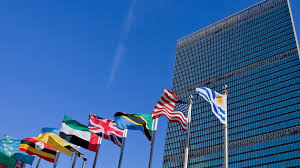Remarks by representative of the Russian Federation Ms Maria Zabolotskaya at the Arria-formula Meeting on the Effect of the COVID-19 Pandemic on Counter-Terrorism Efforts
Mr. Chair,
Allow me to start by thanking Tunisia, other co-sponsors of this Arria Formula meeting, as well as the distinguished briefers for initiating the discussion on how COVID-19 pandemic has impacted international efforts to prevent and counter terrorism and violent extremism conducive to terrorism.
Mr. Chair,
COVID-19 has stimulated further misuse of information and communication technologies for terrorist purposes. Terrorists are actively exploring new means of funding, inciting, preparing and facilitating attacks. There is also a risk of artificial intelligence utilization by terrorists, including with the aim of spreading propaganda, hacking, stealing confidential information, as well as launching attacks against critical infrastructure.
We fully agree with assessments provided by various UN entities regarding the intensification of recruitment campaigns online, which exploit the grievances caused by the pandemic. It should be taken into account that individuals expressing dissatisfaction in relation to governmental activities against the spread of the pandemic are in the focus of recruiters’ attention.
Against this background we must recognize that for many States the financial burden caused by the necessity to stem the spread of COVID-19 is almost unbearable. In some cases it led to significant reduction of resources available for various law-enforcement activities, including those related to counterterrorism. Unfortunately, this situation is exacerbated by the fact that some members of international community continued to impose illegitimate unilateral sanctions that cause nothing but the suffering to innocent civilians.
At the same time, it would not be accurate to make an assumption that the effectiveness of all international efforts to counter terrorism has decreased since the start of the pandemic. Simultaneously with the increased terrorist activities online we also see the strengthened law enforcement cooperation in the virtual domain.
Mr. Chair,
We are convinced that more attention should be given to the worrying tendency of expansion of the geographical scope of terrorism. Weakened governmental institutions in some African States face difficulties in addressing this menace. On the other hand, major terrorist groups seek to exploit COVID-related socio-economic problems to gain support among population. We are particularly alarmed by the situation in Burkina-Faso, Mali and Niger, as well as in the Lake Chad basin in general, where terrorists gradually enhance their capabilities.
The terrorist threat is persistent in other regions as well, especially in the Middle East. The hazards related to COVID-19 by no means prevented terrorist groups from further advancing their goals in Syria and Iraq.
One should not presume that, for example, European States are more secured from terrorism these days. Various COVID-19 related mitigation measures, including temporary travel restrictions, enhanced border control regulations, restrictions onmass gatherings and closure of a wide range of facilities, significantly reduced the ability of terrorists to operate and conduct large-scale attacks. However, we should not underestimate the potential threat from “sleeping cells” in some parts of the region.
Mr. Chair,
We all recognize additional challenges posed by COVID-19 including in the field of counterterrorism efforts. At the same time, the recipe for rectifying the situation is still the same. The international community must unite its efforts in the battle against terrorism and support the central coordinating role of the United Nations and its Security Council in this regard. The Russian Federation calls on all States to fully utilize their agreements on mutual legal assistance and extradition, and enhance cooperation on the basis of the principle “extradite or prosecute”. We should further focus on eliminating any form of support to terrorists, including financial and ideological, and jointly tackle the spread of terrorist narratives online.
I thank you.
